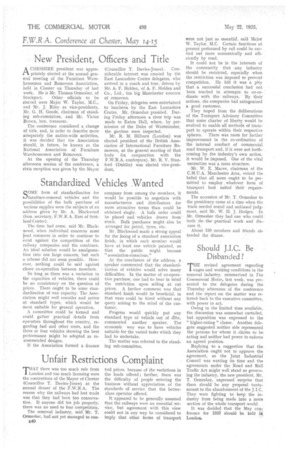Unfair Restrictions Complaint
Page 50

If you've noticed an error in this article please click here to report it so we can fix it.
THAT there was too much rule from London and too much licensing were the contentions of the Mayor of Chester (Councillor T. Davies-Jones) at the annual dinner of the F.W.R.A. The reason why the railways had lost trade was that they had been too conservative. If anyone did his job properly, there was no need to fear competition.
The removal industry, said Mr. T. Ormesher, had not yet managed to con 840 trol prices, because of the variations in the loads offered ; further, there was the difficulty of people entering the business without appreciation, of the standards of service that the betterclass operator offered.
It appeared to be generally assumed that the railways were an essential service, but agreemenit with this view could not in any way be considered to imply that other forms of transport were not just as essential, said Major W. Taylor, M.C. Certain functions at present performed by rail could be carried out more economically and efficiently by road.
It could not be in the interests of the community that any industry should be restricted, especially when the restriction was imposed to prevent competition. He felt it was a pity that a successful conclusion had not been reached in attempts to co-ordinate with the railways. BY their actions, the companies had antagonized a good customer.
They hoped from the deliberations of the Transport Advisory Committee that some charter of liberty would be evolved to enable all methods of trans; port to operate within their respective spheres. There was room for further improvement in the co-ordination of the internal conduct of commercial road transport and, if it were not forthcoming by the industry's own action, it would be imposed. One of the vital necessities was a rates structure.
Mr. W. E. Macve, chairman of the C.M.U.A. Manchester Area, voiced the belief that all users ought to be permitted to employ , whatever form of transport best suited their requirements.
The accession of Mr. T. Ormesher to the presidency came at a time when the trade needed sound and unbiased judgment, said Mr. W. H. J. Hedges. In Mr. Ormesher they had one who could both 'do the practical work and dis-cuss it.
About 130 members and friends attended the dinner.




















































































